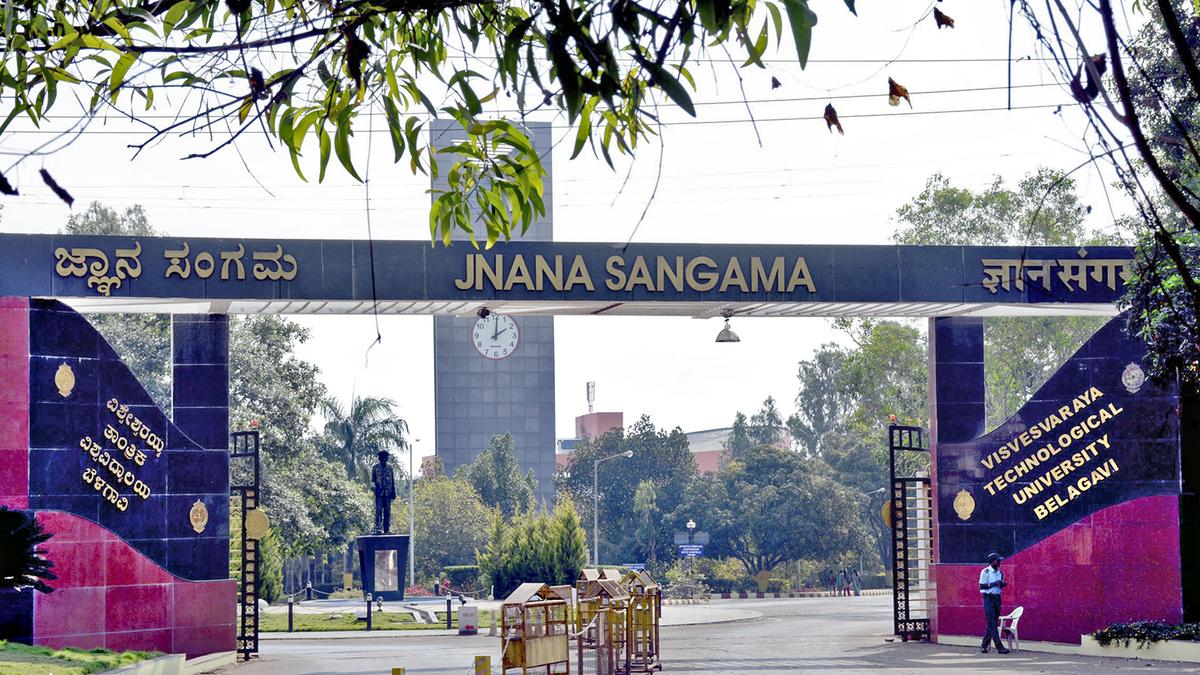Visvesvaraya Technological University (VTU) has announced its first initiative to employ artificial intelligence (AI) in setting question papers and evaluating answer sheets for engineering courses. The move aims to enhance efficiency, reduce human bias, and improve the overall assessment process for thousands of students enrolled across the state. University officials explained that AI algorithms would help generate balanced question papers aligned with syllabus objectives, ensuring uniformity in difficulty levels. The system is expected to streamline evaluation, accelerate results processing, and maintain academic integrity by minimizing subjective errors in grading.
VTU’s AI initiative will begin with select courses before a full-scale rollout. The system uses natural language processing and machine learning to create diverse question sets, analyze answer patterns, and provide objective scoring based on predefined rubrics. University authorities emphasized that faculty involvement remains crucial for oversight and verification, ensuring that AI complements rather than replaces human judgment. Pilot programs will monitor performance, accuracy, and student outcomes, enabling VTU to refine the technology before applying it across all engineering departments.
The initiative has been welcomed by educators and students alike, who see AI integration as a step towards modernizing engineering education. Officials highlighted that AI-driven assessments can reduce evaluation delays, provide detailed feedback to students, and free faculty to focus on teaching and research. VTU plans to collaborate with tech companies specializing in AI applications for education, ensuring the system meets academic standards and regulatory compliance. This marks a significant stride towards transforming traditional examination methods into a technologically advanced, transparent, and efficient system.

Benefits and Challenges of AI Implementation
The adoption of AI in examinations is expected to offer several advantages, including faster result processing, minimized grading inconsistencies, and enhanced ability to detect anomalies such as plagiarism. However, experts caution that challenges remain, such as algorithmic bias, technical glitches, and the need for continuous faculty supervision. VTU has assured that rigorous testing and human oversight will mitigate potential issues, ensuring that assessments remain fair, reliable, and in line with educational objectives.
Students have shown optimism about the move, expecting quicker feedback, transparent evaluation, and a reduced possibility of errors in grading. Educational analysts note that AI’s ability to analyze large datasets can help identify common mistakes and learning gaps, allowing instructors to address weak areas more effectively. While the technology promises efficiency, it also requires careful calibration to ensure that critical thinking and problem-solving skills are adequately assessed rather than simply checking for formulaic answers.

Transforming Engineering Education
VTU’s AI initiative is seen as a pioneering effort in India’s technical education landscape, highlighting the potential of emerging technologies to transform traditional academic practices. By leveraging AI, the university aims to maintain high standards of evaluation, enhance student learning outcomes, and provide a model for other institutions seeking to modernize examination systems. The initiative signals a shift toward data-driven education while preserving the essential role of faculty in guiding and mentoring students throughout their academic journey.
VTU’s AI initiative will begin with select engineering disciplines, including Computer Science, Mechanical, and Electronics, before being rolled out to all branches. The pilot phase allows the university to monitor AI-generated question quality, grading accuracy, and system reliability. Faculty members are actively involved in reviewing and validating the AI outputs to ensure that the questions align with the syllabus and learning objectives. This phased approach is intended to build confidence among students and educators while gradually integrating technology into traditional assessment practices without disrupting academic schedules.
The AI system utilizes natural language processing (NLP) to generate questions of varying difficulty levels. By analyzing prior years’ question papers, curriculum content, and student performance data, the AI can produce a balanced and comprehensive set of questions. This ensures that exams are fair, standardized, and aligned with learning outcomes. Moreover, the system can generate multiple question paper versions for the same examination, reducing the risk of malpractices and enhancing the integrity of the evaluation process across VTU-affiliated colleges.
Machine learning algorithms embedded in the system will aid in evaluating answer sheets objectively. For numerical problems, algorithmic solutions allow instant marking, while written answers are analyzed for relevance, structure, and keyword accuracy. AI-assisted evaluation reduces human bias and ensures consistency in grading across multiple exam centers. Faculty oversight is maintained to verify edge cases, open-ended responses, and conceptual clarity. This combination of automation and expert review provides a balanced approach, ensuring reliability while maintaining academic standards.
Educational experts have welcomed VTU’s move, noting that AI-assisted assessments can reduce delays in results publication. Traditionally, manual evaluation has taken weeks, especially for large batches of engineering students. AI can analyze thousands of answer sheets in a fraction of the time, providing timely feedback and enabling students to identify learning gaps sooner. Faster evaluation also allows educators to plan remedial sessions and adapt teaching strategies more effectively, thereby enhancing overall academic outcomes and student preparedness for subsequent courses or professional opportunities.
Despite its advantages, AI integration presents challenges. Algorithms may misinterpret nuanced answers, particularly in theoretical or essay-based questions. To mitigate this, VTU has designed hybrid evaluation models combining AI scoring with faculty verification. Faculty members are trained to intervene in cases where AI may misjudge creativity, reasoning, or problem-solving approaches. The university has also established feedback loops where discrepancies are used to continuously refine the AI model, improving its accuracy and making the system increasingly robust over successive academic cycles.
The university has emphasized transparency in AI evaluation. Students will have access to AI-generated scoring metrics and faculty verification notes, ensuring clarity in how grades are assigned. In case of disputes, faculty intervention provides a reliable mechanism for reevaluation. This approach reinforces trust in the system, addressing concerns that technology may depersonalize education or reduce accountability. VTU’s commitment to transparency ensures that AI serves as a tool for efficiency without compromising fairness, student rights, or academic rigor.
Data security and privacy remain key concerns in AI-driven examinations. VTU has implemented secure servers, encrypted data storage, and restricted access to ensure that student information and answer sheets are protected. Regular audits and monitoring protocols have been introduced to prevent data breaches or unauthorized access. The university’s IT department collaborates with AI developers to adhere to national cybersecurity standards, providing both students and faculty with confidence that sensitive academic data is handled securely and responsibly throughout the evaluation process.
The AI system is also expected to provide analytics on student performance, identifying trends, common mistakes, and areas requiring improvement. Such insights can help faculty customize teaching methodologies, focus on weak topics, and enhance overall learning outcomes. Students can benefit from personalized feedback, enabling targeted study strategies and better preparation for future exams. By harnessing AI for both assessment and learning analytics, VTU aims to create a more informed, data-driven academic environment that supports continuous improvement in engineering education.
Faculty members have been trained to supervise AI implementation, ensuring alignment with academic policies and assessment guidelines. Workshops, seminars, and hands-on sessions familiarize instructors with AI capabilities, evaluation criteria, and error-handling protocols. This training empowers faculty to effectively integrate AI without feeling replaced or marginalized, maintaining their central role in guiding students and ensuring quality education. The collaborative approach reinforces the university’s commitment to balancing technology adoption with human oversight and pedagogical expertise.
VTU’s move aligns with broader trends in higher education, where AI is increasingly used for administrative efficiency, assessment, and personalized learning. By pioneering AI in exam preparation and evaluation, the university sets a benchmark for other institutions in India. The initiative demonstrates how technology can complement traditional teaching while upholding rigorous academic standards. Education policy experts believe that such interventions, if properly implemented, could transform assessment practices nationwide, making them more efficient, reliable, and student-centric.
Students have expressed curiosity and cautious optimism about AI-assisted evaluation. While some worry about overreliance on technology, many are excited about faster results, detailed analytics, and reduced human bias. Student unions and academic forums have been engaged to gather feedback during the pilot phase, ensuring that concerns are addressed and suggestions incorporated. This proactive engagement fosters confidence in the AI system, making students active participants in shaping modern, technology-driven educational practices at VTU.
The university plans to expand AI applications beyond examinations, exploring possibilities in curriculum planning, automated content generation, and skill assessment. By leveraging AI’s analytical capabilities, faculty can design adaptive learning programs, identify knowledge gaps in real time, and provide customized support to students. This long-term vision positions VTU as a leader in integrating technology into higher education, preparing students for future workplaces where AI and automation will play a significant role.
Collaborations with technology firms have been crucial in developing the AI evaluation system. VTU has partnered with AI startups and established tech companies to ensure the algorithms meet academic requirements and maintain ethical standards. Continuous research and development help refine the system, incorporating feedback from both faculty and students. This collaboration ensures that AI tools are not only technologically advanced but also pedagogically sound, aligning with the university’s mission to provide high-quality engineering education while embracing innovation.
Officials have emphasized that AI will never replace faculty judgment but will act as a tool to enhance efficiency, transparency, and reliability. Human oversight remains essential, particularly for complex or subjective answers. VTU’s hybrid model, combining AI scoring with expert review, aims to strike the right balance between automation and human evaluation. By demonstrating responsible use of AI, VTU sets an example for other universities looking to modernize assessment practices while maintaining academic integrity and trust in the educational system.
Follow: Karnataka Government
Also read: Home | Channel 6 Network – Latest News, Breaking Updates: Politics, Business, Tech & More

